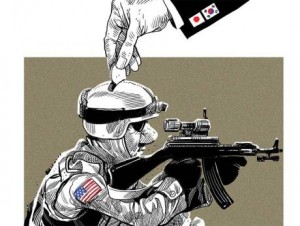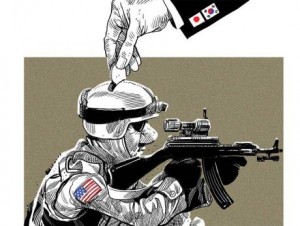- The current election’s tone may render a post-Obama ‘rebalance to Asia’ untenable at a great loss to the US
Washington Post
Yoichi Funabashi | Chung Min Lee
 As the world watches the US presidential election with bewilderment and unease, America’s allies in Asia are particularly concerned about the possibility of US disengagement from the region. In Japan and South Korea — America’s most important allies in the Asia-Pacific — the rise of Donald Trump, along with inward- looking rhetoric from others across the US political spectrum, has been seen as an indication of a broader shift in public sentiment. Tokyo and Seoul fear that many Americans believe that withdrawal from international alliances and institutions can, to use Trump’s formulation, “make America great again.”
As the world watches the US presidential election with bewilderment and unease, America’s allies in Asia are particularly concerned about the possibility of US disengagement from the region. In Japan and South Korea — America’s most important allies in the Asia-Pacific — the rise of Donald Trump, along with inward- looking rhetoric from others across the US political spectrum, has been seen as an indication of a broader shift in public sentiment. Tokyo and Seoul fear that many Americans believe that withdrawal from international alliances and institutions can, to use Trump’s formulation, “make America great again.”
Isolationism and protectionism took a firm hold on US politics during the primaries. In his foreign policy speeches, Trump declared that ‘America First’ would be the overriding theme of his administration, and the Asia-Pacific doesn’t appear to register in his worldview at all. But a US withdrawal or fundamentally reduced US military presence in Asia would not only undermine regional security; it would also ultimately weaken the United States at home and abroad.
While Trump is right to question whether many US allies are essentially free-riders, this can’t be said of either Japan or South Korea. As the world’s third- and 11th-largest economies, respectively, Japan and South Korea assume a significant portion of the cost of stationing US forces within their borders. Japan pays about $4.5 billion (Dh16.52 billion) a year in base-related expenses, while South Korea contributes about$870 million — 75 per cent and 40 per cent of the total costs, respectively. For the US, it is cheaper to station troops in these Asian nations than it would be to house them at home. Equally important, these two allies are major markets for US arms exports. According to the Stockholm International Peace Research Institute, from 2014 to 2015, Japan imported $741 million and South Korea $470 million worth of arms from the US.
So how do Japan and South Korea make the US strong? First and foremost, through alliances that demonstrate the importance of shared democratic values, interoperable military capabilities and deep economic linkages. Absent partnerships with Japan and South Korea, not to mention Australia, the US would have no real presence across the Asia-Pacific. In such an instance, China would quickly move to fill the vacuum and establish its own Sino-centric order.
Second, both Japan and South Korea have been exemplary partners in the fight against nuclear proliferation. Indeed, while Trump has suggested that Tokyo and Seoul should consider their own nuclear options in the face of a nuclearised North Korea, the best way to counter Pyongyang is through robust alliances with the US, including an ironclad nuclear umbrella. Enticing as it may seem, a nuclear South Korea and Japan would trigger a regional nuclear arms race, cripple their alliances with the US and lead to a much more aggressive China and Russia.
Rules-based order
Third, Japan and South Korea are both committed to fostering free trade and the rules-based liberal international order that the US created and benefits from the most. Political candidates from both the Republican and Democratic parties have convinced the public that the Trans-Pacific Partnership would hurt the US economy, when in reality the US would gain the most from the agreement, with analysts estimating that real incomes would increase by $131 billion and annual exports by $357 billion. The TPP would allow the US to continue to set the rules of the road on trade, rather than being subjected to a regime designed by another country. Of course, we don’t really know how Trump would approach Asia in the White House. As president, Trump says unpredictability would be his secret weapon — rather than telling allies and adversaries what the US would do in a given situation, he hopes to gain the upper hand by keeping them guessing. On the face of it, Trump is combating what political scientist Stephen Walt called a “credibility addiction” that can leave the US entangled in costly wars just to reaffirm its resolve. The US has made mistakes, but credibility is vital in a world of uncertainty — especially in Asia. US President Barack Obama’s administration has demonstrated that credibility need not be purchased through force; it can come from articulating clear strategies that give other nations confidence the US will follow through.
Even if Trump loses in November, Japan and South Korea must wake to the negative long-term impact that his campaign could have on America’s politics. History offers a lesson as to what their response should be. After the Vietnam War ended in 1975, then-presidential-candidate Jimmy Carter called for a total pullout of US troops from the Korean Peninsula. Acknowledging a shared fear of US disengagement from the region, and despite rocky relations in the years prior to the proposal, Japan and South Korea cooperated on opposing the plan, and their joint efforts were successful. Likewise today, Tokyo and Seoul’s priority should be to build on last year’s thaw in ties by scheduling a first full state visit and bilateral summit between Japanese Prime Minister Shinzo Abe and South Korean President Park Geun-hye.
The Obama administration has made clear that the US’ destiny is inseparably tied to the Asia-Pacific, but the tone of the current election may render a post-Obama “rebalance to Asia” untenable. Japan and South Korea cannot assume that the US will make the rational choice of placing its bets on Asia as the dominant region of economic growth in the 21st century. As the lynchpins of the US alliance in the Asia-Pacific, Japan and South Korea will need to work together to convince policymakers in the US that an America First policy would result only in what Trump might call a “tremendous” loss — for the US, its closest allies and the world.



